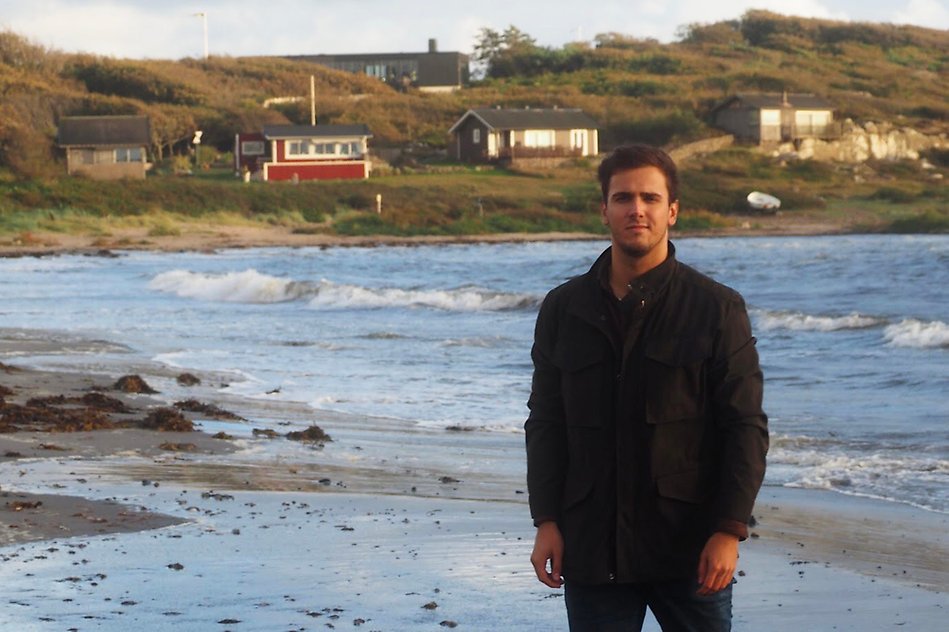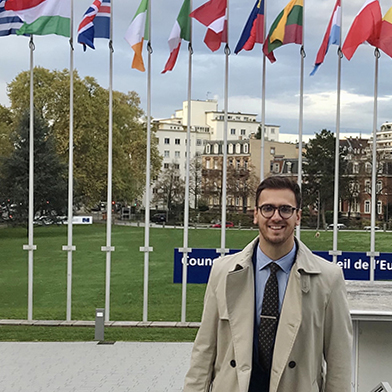“An incredibly valuable and rewarding experience”
Collaborative Governance in a Digital Era caught Atilla Rexhas attention straight away. According to him, the module's focus is particularly relevant to the challenges facing the Western Balkan region. “The opportunity to meet and work alongside other young professionals from the Western Balkans was particularly attractive to me in the module” says Atilla Rexha, who studied the module in 2022.

Atilla Rexha, who is working for a civil society organisation, is always on the lookout for opportunities to develop his skills and knowledge to better serve his community. In the photo, a vist to Steningen strand north of Halmstad.
Atilla Rexha who is working as a researcher at the Balkans Policy Research Group, says he is always seeking to expand his network and learn from others.
“I was excited to engage with the welcoming and professional academics at Halmstad University” he says.
Meet other young professionals
“The opportunity to meet and work alongside other young professionals from the Western Balkans was particularly attractive to me in the module. I knew that the module's combination of lectures, seminars, study visits, and group work on tailored assignments would provide a dynamic and collaborative learning environment that would allow me to share my knowledge and learn from others.”
“It allowed me to see how various countries in the Western Balkans can get together to address shared challenges.”

Atilla Rexha is in a civil society organisation.
His work in Kosovo primarily involves conducting research and analysis on a range of policy issues affecting the Western Balkan region. This includes studying the impacts of various governance models and trends, and exploring the potential of collaborative governance.
“The Western Balkans, including Kosovo require innovative solutions to policy changes in regards to their statebuilding and small political systems.”
A crucial take away from the module, says Atilla Rexha, is an enhanced understanding of collaborative governance in the digital era.
“I left the training with new skills and competencies that I can apply into my work.”
Network and critical reflection
Networking is another important aspect of the module. After the module, he has friends that he remains in touch with in different NGO’s and public administrations in all Western Balkan countries. These relationships provide him with valuable connections and opportunities for future collaborations.
“Also, critical reflection is a key component of the module. It has helped me to develop a more nuanced and critical understanding of the assumptions driving international governance trends and technological development. I am now better equipped to meet the policy challenges facing the Western Balkan region.”
The teachers gave a big theoretical input on for example collaboration as a specific governance mode that differed from those that formed the modern public administration organisation.
“I knew that this training would provide me with a unique opportunity to critically reflect upon international governance trends and technological development and to learn about the potentials and risks associated with digitisation processes.”
Experience and study visits
He takes new skills and experiences to his job as a researcher in Kosovo.
“I feel equipped with a wealth of knowledge and experiences that will enable me to conduct even more informed and impactful research. I am excited to apply what I have learned to my work and to share my experiences with my colleagues and peers in the field.”
Particularly valuable and memorable were the study visits to Halmstad Municipality and State Service Office in Halmstad, Sweden, and to the Nordic Council and Greater Copenhagen offices in the Danish capital.
“They allowed me to see firsthand how Collaborative Governance in the Digital Era operates in real-life settings. These visits provided valuable opportunities to learn from experts and practitioners in the field, ask questions, and deepen my understanding of the concepts covered in the lectures and seminars.”
He very much appreciated the visit at the Nordic Council in Copenhagen to see how collaboration can work on a regional level.
Shared challenges
“It allowed me to see how various countries in the Western Balkans can get together to address shared challenges. The visit likely provided insights into the challenges and opportunities associated with cross-border collaboration, and how digitization is transforming the way regional bodies operate.”
Visits to the Swedish coast and countryside added more input.
“We got the time to socialise and converse, in front of beautiful sceneries, about collaborative governance with the organising team – academicians from whom I took great inspiration” says Atilla Rexha and concludes:
“Overall it has been an incredibly valuable and rewarding experience that I will always cherish.”
Text: Kristina Rörström

